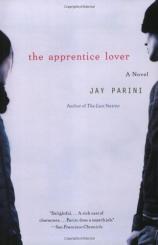Interview: April 19, 2002
April 19, 2002
Middlebury College instructor Jay Parini is well-known for his poetry, biographies, and fiction. In this interview with Bookreporter.com's Andrea E. Hoag, Parini discusses his latest novel, THE APPRENTICE LOVER, and voices his opinion on the importance of a novel's narrative and how to combat writer's block.
BRC: THE APPRENTICE LOVER is set in Capri, Italy. Why did you feel particularly drawn to that area?
JP: I first visited Capri in 1971, and fell in love with the island. I've always loved Italy in general. My ancestors came from there. I go back whenever I can to visit.
BRC: Alex Massolini, your protagonist who is an aspiring writer, carries Rilke's LETTERS TO A YOUNG POET in his knapsack when he travels to Capri. What other books should be required reading for writers at the start of their careers?
JP: It's hard to say. Lots of books. I would certainly recommend ASPECTS OF THE NOVEL by E. M. Forster as essential reading. Perhaps the notebooks of Somerset Maugham. I would also read essays by writers such as Graham Greene and Gore Vidal. Poets should read the LITERARY ESSAYS OF EZRA POUND and T. S. Eliot's SELECTED ESSAYS.
BRC: One of THE APPRENTICE LOVER'S greatest scenes involves a dinner with invented characters such as the novelist Rupert Grant, as well as actual literary figures Graham Greene and Gore Vidal. If you had the chance to eat a leisurely meal with any three writers in history, who would you choose, and why?
JP: I'd really like to sit down to dinner with Leo Tolstoy. His mind was among the most interesting of all writers of the past. I'd also have enjoyed meeting Dickens. His energy must have been dazzling.
BRC: Rupert Grant gives his young apprentice a witty bit of advice when asked how to beat writer's block: "lower your standards." What is your recommendation for writers who have reached a difficult point in their work?
JP: If a writer gets blocked, he or she should relax and do something else for a while. Getting blocked can also be the result of the critic in the person's head getting in the way. Don't be critical. Just write. You can always revise. And that's easier than original composition, which can be very difficult!
BRC: Alex encounters a professor at Columbia who closes the door on being his mentor. How do you juggle a writing career, an academic post and family life while acting as a mentor to your students at Middlebury?
JP: There's really more time available than most people think. If you just don't watch TV, you can add several hours a day to your schedule. Focus is the main thing: one mustn't spend a lot of time looking out the window... I've learned how to balance things the hard way: I've often failed to keep things in balance. I'm older now, and a tiny bit wiser. Just a tiny bit...
BRC: Rupert Grant tells Alex that a strong narrative is more important than the story in fiction. Which side of the argument do you come down on where narrative versus story is concerned?
JP: I agree with Rupert. Narrative is everything. Story is artificial, but elements of plotting make a narrative stronger. So I'd say I value both sides of this argument, but think that JUST story alone is meaningless
BRC: Since Bookreporter.com is quite popular with writers, I'd like to ask you a bit about your process. Do you keep extensive longhand notes and later transfer them to a computer?
JP: I work in a notebook, writing by hand, taking notes. I often transfer the notes, in fact, to a computer. My poems are ALWAYS written by hand, then typed onto a computer for revision. Prose I find I can write directly onto a computer screen...and revise on the computer. I'm not a systematic writer, in fact; my work moves along in various ways. I'm fairly practical, so I do whatever I need to do to get my work accomplished.
BRC: Although THE APPRENTICE LOVER is a novel, you've included Gore Vidal as a character. Were you apprehensive at first about putting a person you're acquainted with into your book?
JP: I was indeed nervous about including Gore, who is a good friend. But I didn't put him into the book in such a way that it would cause either of us to lose any sleep over the matter.
BRC: You are someone I would term a "writer's writer," though THE APPRENTICE LOVER is accessible enough to be enjoyed by anyone, and with its wide appeal, the book would make an extraordinary film. Given the mixed results of recent film adaptations of novels, would you welcome such an opportunity?
JP: I'd certainly welcome any film adaptation of my novel. In the past, I've worked with producers and actors. Anthony Quinn and I wrote the filmscript of THE LAST STATION (not yet produced, but still a possibility) together...a difficult and unnerving process. I don't want to write the script of this one myself. I do think it would make a fine film, though; I hope somebody can do it.
BRC: May I ask what you are reading now?
JP: I'm reading David Gilmour's life of Rudyard Kipling...a splendid book. And I'm about to read Ian McEwan's ATONEMENT. I like McEwan's earlier work a great deal.




